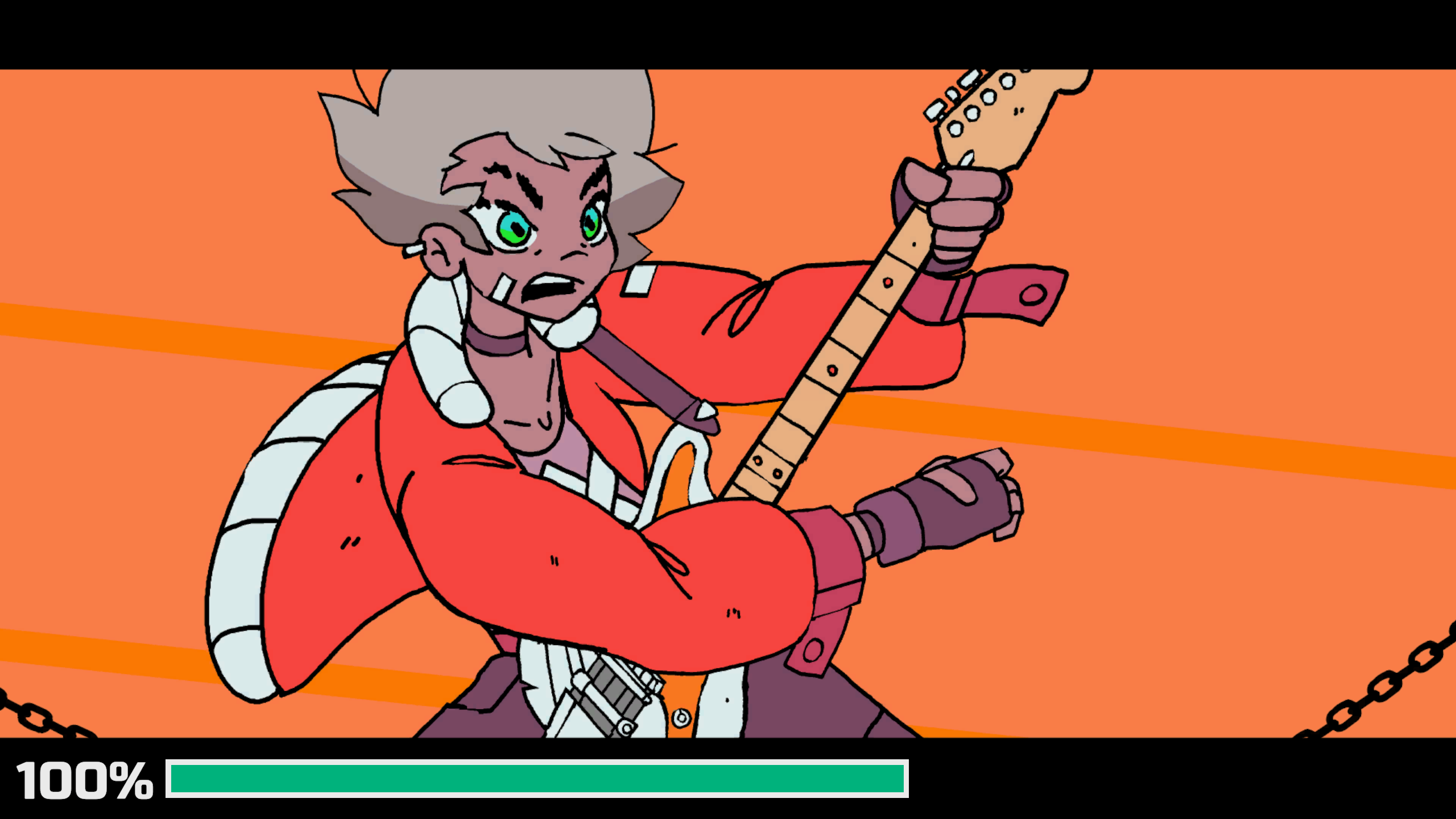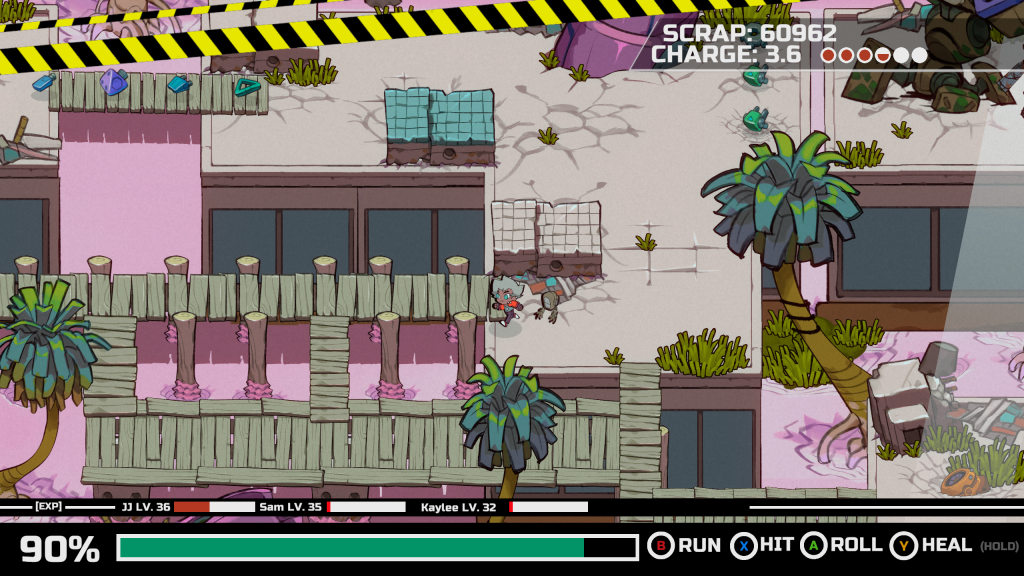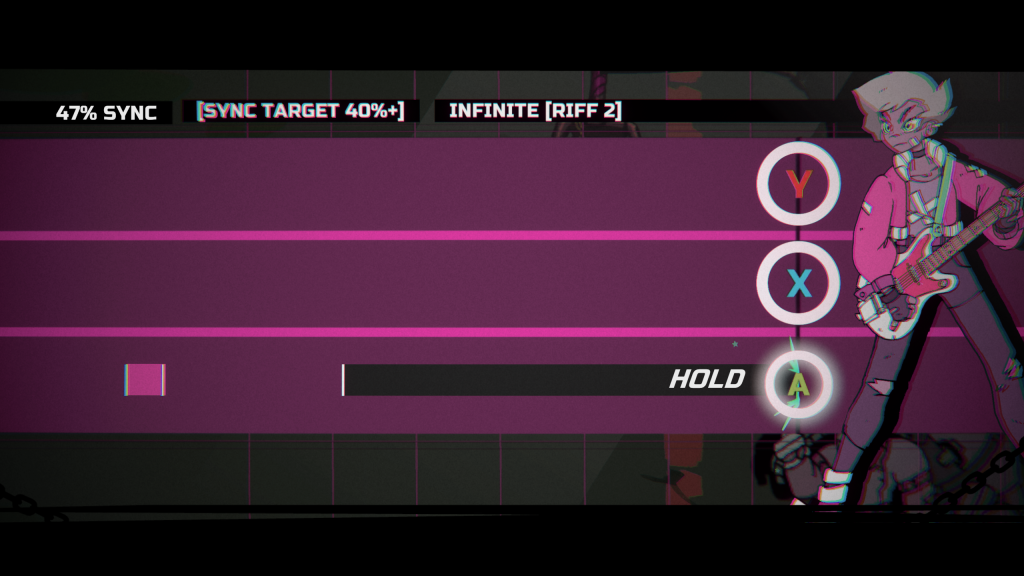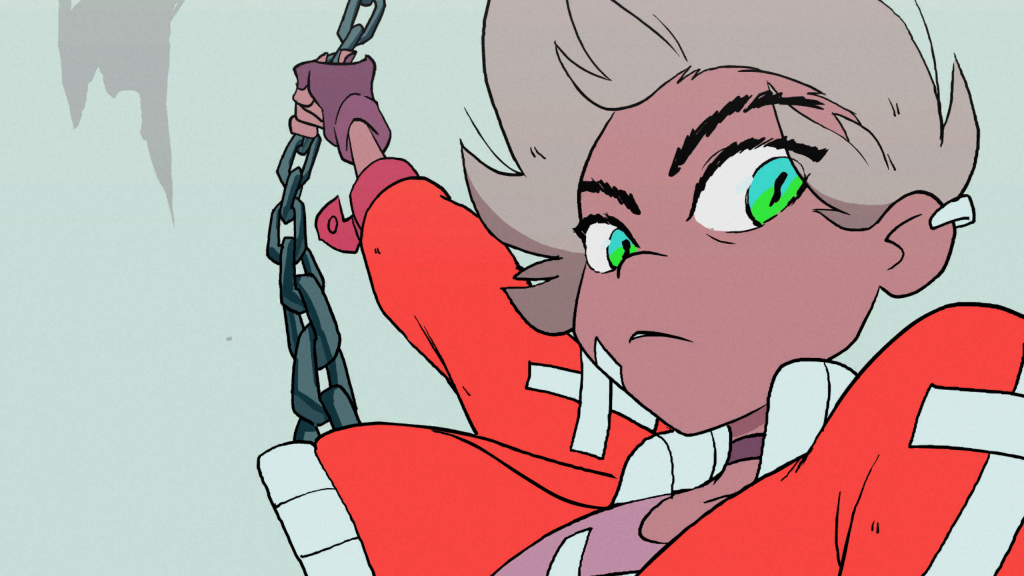
Infinite Guitars is a rhythm action RPG set in a world of floating sky islands and guitar-wielding scavengers who eke out their existence in the aftermath of a desperate rebellion. Its hero, J.J., is a disaffected kid traveling with their grandfather. When rogue elements of the old empire confront them, J.J. is separated from their grandfather and must travel the world to find friends and grow stronger.
The island worlds are overrun with the wreckage of old machinery, defense systems, and erratic mechanical monsters left behind by war. The environments alone are harsh and hostile, and small communities take care of each other as best they can. The world is full of people balanced precariously between urgent hope and total despair as resources dry up. For some, their only remaining option is to sell themselves into a life of endless labor for the empire in distant mines.
The title is the debut game from Nikko Ronsayro (and his small team), an animator-turned-indie-dev who imbues the game with a deep love of stylized animation and anime aesthetics. It features a mishmashed combination of mechanical conceits that land with varying degrees of success, but in the end, there's a lot that's worth the trouble.

Playing to Win
The structure of Infinite Guitars is broken down into three different core gameplay mechanics (each with a separate difficulty setting): the rhythm minigames, the turn-based(-ish) RPG combat, and the overworld action "combat" (mostly, running around dodging hazards). These three elements feed into each other; take too much damage from hazards and you'll enter combat with less health to spare, play rhythm minigames to activate switches and open doors, or time your strike in the overworld to get the first turn in a fight. Rhythm minigames are also integral to combat; most moves involve a short music sequence to resolve the attack.
Of these three interlocking systems, the overworld traversal is certainly the weakest, held back by odd invisible edges in the terrain. In the RPG combat, all enemy attacks are dodgeable with the right timing, which can lead to combat having an odd cadence to it. Certain damage types are better against certain enemy types, but this rarely leads to especially interesting decision making; mostly, it just lets different party members shine at different moments.
But for the frequent clunkiness, the heart and soul of the game is its rhythm sequences. They're a deceptively simple 3-button note track game, which interestingly chooses to use face buttons that necessitate thumbing two adjacent buttons at once when using a typical controller grip. This surprised me, but I found it to be fairly manageable. The rhythm game's grading is relatively forgiving, but its complexity and stakes attempt to compensate. Rhythm sequences "wager" health, and must be completed with as much accuracy as possible to ensure maximum damage, and to win back the health that was spent to make the attack.
In the end, the game has few especially difficult rhythm sequences, but the rotating variety of bite-sized song segments invites a sense of practice and perfection that can be satisfying. Moreover, the tracks are provided by a variety of artists and are all great fun. It's a good reminder that the fun of rhythm games is not just perfecting the note chart, but also the simple joy of playing along with the music. Add to the mix some wonderful high-energy animations and stellar character design (which conveys a great deal of diversity despite being highly stylized), and the overall aesthetic package is very appealing.

Fight The Power
Infinite Guitars is a work that wears a lot of its influences proudly, from the Persona-esque victory screen to the dramatic special attack animations reminiscent of fighting games. There's the obvious influence of Guitar Hero on the audio design and the classic note-track-style rhythm gameplay. But maybe the most striking influence is the animation and storytelling of Studio Gainax in the aughts, particularly Gurren Lagaan and FLCL. The melodrama, bombast, and profound sense of heart and hope recall some of Gurren Lagaan's best moments, as do many of the stylized animation sequences.
Infinite Guitars can sometimes feel unfocused and perhaps overwrought, likely a consequence of such a small team trying to build a proper 10-hour-long indie RPG. But despite some overlong sequences, the broad strokes of the storytelling shine through. It's frequently over-the-top, but often reaches for moments of wistfulness, tragedy, redemption. Moment-to-moment writing in Infinite Guitars is one of its many inconsistent elements, but the world-building is great fun, full of cool concepts and Proper Nouns. It also has some genuinely affecting thematic ideas around human spirit and resilience in the face of oppression.
I loved a lot of the little conceptual flourishes of Infinite Guitars' imaginative setting. Despite a bit of tedium around the endgame, it lands with easily one of the most emotionally satisfying endings to a video game that I've played this year. It delivers a form of heightened anime drama that I simply haven't seen accomplished in a video game, a truly heartfelt and affecting homage to its influences.

Conclusion
Infinite Guitars is certainly the roughest game in my list this year. Many of its ideas are engaging at first, but fail to stretch out across its runtime without losing their luster. Its ambitions sometimes go in strange directions that detract from its most successful elements. And some of its incidental writing is bland and clumsy. But its abundant love for anime, guitar solos, stylish attack sequences and rebellious spirit overwhelmingly won me over. Even when the exploration sequences become a bit of a slog, the consistently catchy music is a sufficient salve.
This is once again a difficult game to recommend, but I know it has an audience among those who can spare it a bit of patience. It's an unabashed passion project, loaded with excellent work from talented musical and artistic collaborators. As much as I loved everything else on my list this year, very few games I played have quite this much heart.